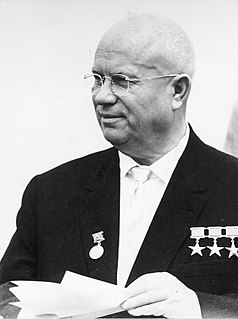A Quote by Arthur Henderson
The nations must be organized internationally and induced to enter into partnership, subordinating in some measure national sovereignty to worldwide institutions and obligations.
Related Quotes
All 'isms' run out in the end, and good riddance to most of them. Patriotism for example. [...] If in the interest of making sure we don't blow ourselves off the map once and for all, we end up relinquishing a measure of national sovereignty to some international body, so much the worse for national sovereignty. There is only one Sovereignty that matters ultimately, and it is of another sort altogether.
Since trade ignores national boundaries and the manufacturer insists on having the world as a market, the flag of his nation must follow him, and the doors of the nations which are closed against him must be battered down. Concessions obtained by financiers must be safeguarded by ministers of state, even if the sovereignty of unwilling nations be outraged in the process. Colonies must be obtained or planted, in order that no useful corner of the world may be overlooked or left unused.
Internationalism is a community theory of society which is founded on economic, spiritual, and biological facts. It maintains that respect for a healthy development of human society and of world civilization requires that mankind be organized internationally. Nationalities should form the constitutive links in a great world alliance, and must be guaranteed an independent life in the realm of the spiritual and for locally delimited tasks, while economic and political objectives must be guided internationally in a spirit of peaceful cooperation for the promotion of mankind's common interests.
In a free society, every opportunity comes with three obligations. First, you must seize it. You must mold it into a work that brings value to others. Second, you must live it. Opportunity is nurtured only by action. Third, you must defend the freedom to pursue opportunities. You must embrace these three obligations as if the future of the United States depended on it. In fact, it does.
The concept of national sovereignty has been an immutable, indeed sacred, principle of international relations. It is a principle which will yield only slowly and reluctantly to the new imperatives of global environmental cooperation. It is simply not feasible for sovereignty to be exercised unilaterally by individual nation states, however powerful. The global community must be assured of environmental security.


































